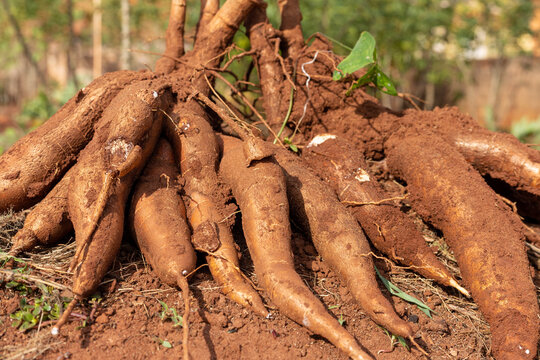Phase I: Theoretical Foundation
Introduction to Global Trends in Cassava Production
Basics on the Evolution of Cassava Species
- Understanding different species of cassava.
- Industrial raw material vs. staple consumable varieties.
Good Agricultural Practices (GAP)
- Implementation of GAP in cassava farming.
- Ensuring sustainability and productivity.
Safe Agrochemical and Pesticides Handling
- Proper use and management of agrochemicals and pesticides.
- Safety protocols to protect health and environment.
Farmer Business School
- Fundamentals of managing a cassava farming business.
- Financial planning and market strategies.
Understanding the Socio-Economic and Nutritional/Health Importance of Cassava
- Role of cassava in improving nutrition and health.
- Socio-economic benefits and impact on communities.
Understanding the Cassava Value Chain
- Comprehensive overview of the cassava value chain.
- Key stages and processes involved.
Evolution and Perspective of Cassava Production in Cameroon
- Historical context and future outlook of cassava production.
- Challenges and opportunities in Cameroon.
Digital Data Collection, Analysis, and Deployment for Improved Cassava Value Chain Development in Cameroon
- Utilizing digital tools for data collection and analysis.
- Enhancing cassava value chain development through technology.
Basic Strategies for Entrepreneurship in the Cassava Ecosystem and Common Pitfalls
- Entrepreneurial strategies for success in the cassava value chain.
- Identifying and avoiding common pitfalls.
Using Digital Solutions to Translate Sustainability into Action in Cassava Value Chain Exploration
- Implementing digital solutions for sustainable cassava farming.
- Case studies and best practices.
Available Assistance to Commercial Enterprises in the Cassava Value Chain in Cameroon
- Exploring opportunities and support available for cassava enterprises.
- Contributions to socio-economic development.
Theoretical Sessions
- Cassava Cultivation
- Planting preparation (land, seed variety, etc.).
- Planting process (dates, seed rate, seed dressing, planting spacing, etc.).
- Soil treatment, pests, and disease control.
- Harvesting and post-harvest operations (uprooting, cleaning, storage, and transportation techniques).
- Overview of Possible Uses of Cassava
- Detailed exploration of cassava value chain applications.
- Developing a Standard Entrepreneurial Project for a Value Chain
- Conducting feasibility studies.
- Business planning essentials.
- Financial and market/sales planning.
- Personnel and management strategies.
Phase II: Practical Field Training
Field and Classroom Training
- Dual training sessions combining practical fieldwork and classroom instruction.
- Hands-on experience in an existing cassava farming enterprise.
- Guided mentorship for replicating the value chain independently.
Enterprise Development
- Participants produce a ready-to-rollout enterprise in the cassava value chain.
- Simulation of real-life situations, including pitching exercises.
- Videos of successful ventures.
Graduation from the Incubator
- Completion of practical field training.
- Participants graduate with a developed enterprise plan.
Phase III: Handholding for Enterprise Rollout
Mentorship and Support
- Experts/mentors with proven success in cassava farming guide participants.
- Ongoing support for the full rollout of the enterprise.
Expected Outcomes
Learners who complete this course will:
- Gain comprehensive knowledge of the cassava value chain.
- Develop and execute a commercial cassava farming enterprise.
- Acquire practical skills in cassava cultivation, pest control, and post-harvest management.
- Implement digital solutions for data collection and sustainability in cassava farming.
- Receive hands-on experience through practical field training and mentorship.
- Graduate with a ready-to-rollout cassava farming enterprise.
Possible Certifications
Cameroon Certifications:
- Vocational Training Certificate in Cassava Value Chain Management.

